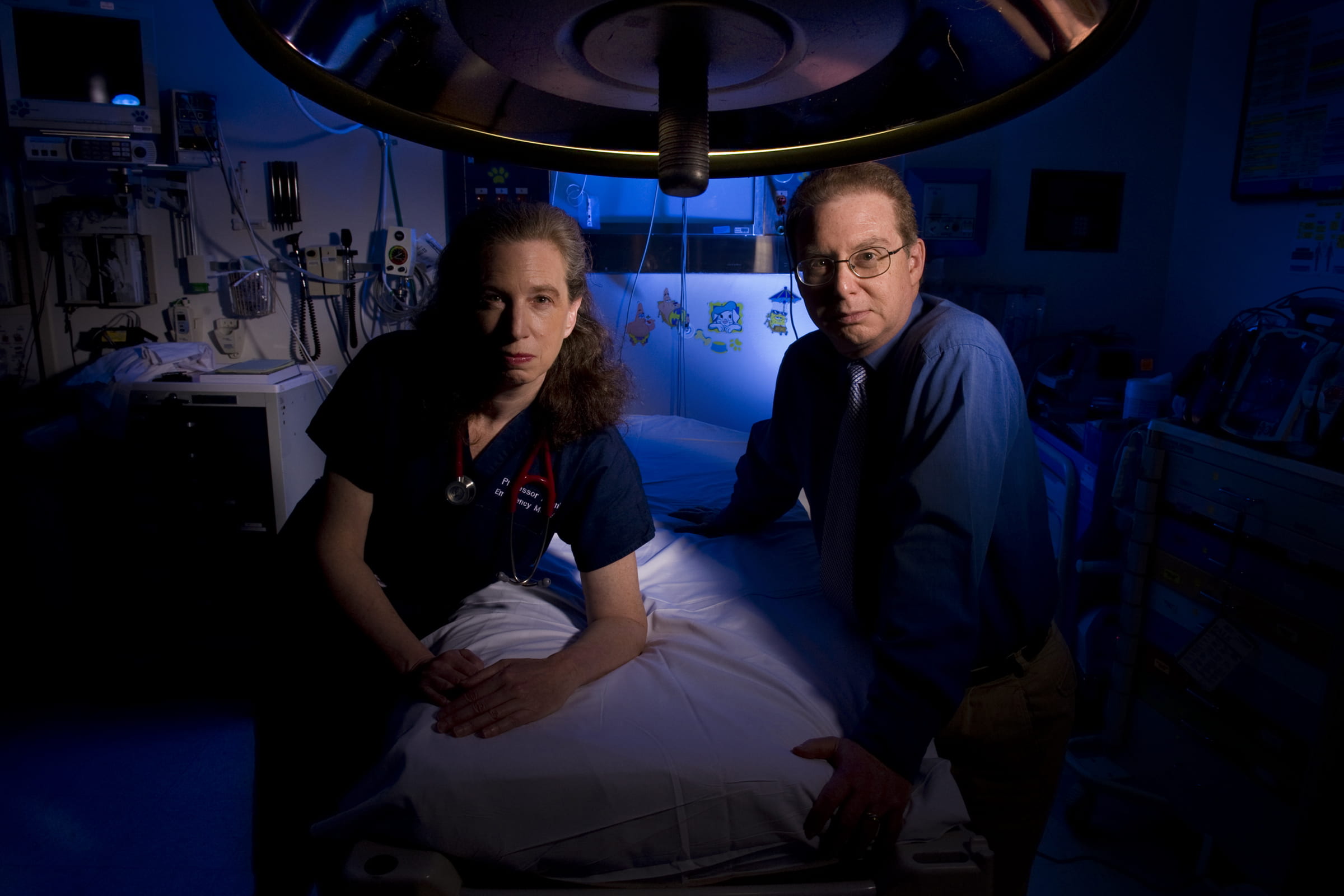Masters of disaster
UCI doctors Kristi Koenig and Carl Schultz wrote the book on disaster medicine. Its publication comes amid debate on the way medical care is delivered in a crisis.

UC Irvine doctors Kristi L. Koenig and Carl H. Schultz are not just world-renowned experts in disaster medicine. They have, quite literally, written the book on the subject.
Published last fall by Cambridge University Press in association with the American College of Emergency Physicians, Koenig & Schultz’s Disaster Medicine: Comprehensive Principles & Practices is intended for anyone who manages or trains people involved in disaster response, including public health officials, paramedics, hospital staff and medical school students.
“Emergency responses to Hurricane Katrina and recent earthquakes in Haiti and Chile emphasize the need for expertise in disaster management,” says Koenig, UCI’s director of public health preparedness. “It’s an emerging science, and up until now, there have been no comprehensive texts on it.”
Their book is being well received. “This mix of operational, academic and governmental influences results in chapters that are incredibly detailed and fresh, with current developments in this field,” writes Dr. Scott R. Lillibridge, executive director of Texas A&M’s National Center for Emergency Medical Preparedness & Response.
The publication comes amid debate over the way medical care is delivered during disasters. Prompted by the recent H1N1 scare, the prospect of a catastrophic earthquake in California, and this month’s attempted car bombing in New York’s Times Square, caregivers, ethicists and local, state and national public health officials are re-examining emergency response systems.
“The big issue is how to allocate scarce resources,” says Koenig. “In a truly catastrophic event, we won’t have the resources to save everyone, so we need policies and procedures governing crisis care that will maximize benefit to the affected population.”
This requires a shift in attitude and an agreement on basic terminology. “Crisis standard of care” – the phrase adopted by the federal Institute of Medicine – was coined by Koenig, Schultz and their colleague Dr. Tareg A. Bey to describe emergency guidelines when resources are scarce.
“The usual standard of care is based on doing everything possible for the individual,” says Schultz, UCI’s director of disaster medical services. “But what’s the standard during a widespread disaster?”
He and Koenig want to see a uniform approach to resource management under such circumstances. They believe, for example, that after an earthquake, all Orange County hospitals should offer similarly injured patients the same treatment.
“Problems occur when you leave it up to each site to determine how to ration its resources,” Schultz says. Discussion of this issue will continue within the public health community until a consensus emerges.
Koenig and Schultz have prominent voices in emergency and disaster medicine. Koenig is a national spokeswoman for the American College of Emergency Physicians, and Schultz chairs ACEP’s disaster preparedness and response committee.
They investigated hospital evacuations after 1994’s Northridge earthquake and have evaluated disaster triage systems and strategies to handle casualties from the use of biological weapons.
Their expertise is in demand. In March, Koenig moderated and co-chaired the National Emergency Management Summit in Washington, D.C. She also spoke about medical response to the Haiti earthquake. Schultz addressed respiratory protection for healthcare workers, including the debate over respirators versus surgical masks that accompanied H1N1 preparation nationwide.
In April, Koenig participated in a Washington, D.C., conference at which officials from London, Madrid and Tel Aviv, Israel, discussed responses to terrorist attacks in urban areas. Terrorism also requires government and medical system mobilization to meet the potential for mass casualties.
“We learn new things with every disaster,” says Koenig. “These meetings are a good way to spread knowledge about the latest threats and increase awareness of the need to prepare for a variety of events.”
They also help legitimize disaster medicine as an emerging science.
Few medical schools or teaching hospitals provide disaster medicine education. But UCI – which offers a Fellowship in Emergency Medical Services/Disaster Medical Sciences and an International Disaster Medical Sciences Fellowship – has long been a leader in the field, with Koenig and Schultz at the heart of the effort.
When they aren’t addressing national and international disasters, the two work with medical students and residents as attending physicians in UC Irvine Medical Center’s emergency department.
“Teaching and treating the public gives me a better perspective when advocating state and national policies,” says Koenig. “Many people in government are too far removed from the front lines to recognize the practical implications of some disaster policies.”